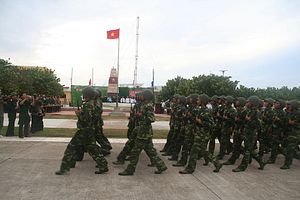Last week, reports surfaced related to the sinking of a Vietnamese vessel near the South China Sea. The development spotlighted longstanding tensions that continue to simmer between China and Vietnam with respect to the South China Sea and the old, evolving dynamics of the flashpoint that continue to be important to watch even amid the global coronavirus pandemic.
As I have observed previously, even amid COVID-19 which has impacted countries across the Asia-Pacific, it continues to be important to monitor some of Asia’s key flashpoints including the South China Sea. Despite an illusion of calm with respect to the South China Sea, we have nonetheless seen continued tensions over the past year, including between Beijing and Hanoi which remain the two most capable claimants in a series of complex disputes.
Late last week, we saw a case in point of this with another incident in the South China Sea between China and Vietnam. The incident, involving a Vietnamese fishing vessel and a Chinese maritime surveillance vessel, saw the Vietnamese vessel being sunk and a flurry of comments in response by both sides, with Vietnam protesting the ramming and sinking of the vessel and China claiming that the boat had illegally entered the area, refused to leave, and then collided with a Chinese vessel after making dangerous maneuvers.
Irrespective of the specifics in the incident itself, the development speaks to the continued risk of tensions in the South China Sea even as countries tackle COVID-19. Despite notable calls for the temporary suspension of conflict or tensions to deal with the pandemic, in the maritime realm and spheres such as the South China Sea, there has been no sign of any sort of ‘ceasefire’ and the risk of either inadvertent miscalculations or deliberate provocations remains high. Indeed, the dynamics related to the sinking of the Vietnamese vessel is similar to previous instances we have seen as well – including the cancellation of meetings, the disruption of resource exploration activities, and the harassment of fishing vessels – despite clear evidence that these developments run against previous mechanisms both sides have reached to manage maritime tensions and wider documents such as the Declaration on the Conduct of Parties in the South China Sea.
More specifically, the incident will only reinforce anxieties that, contrary to any sort of strategic pause to China’s maritime assertiveness, Beijing continues to see little contradiction between expressing solidarity with neighboring states regarding COVID-19 while also continuing to incrementally advance its claims in the South China Sea. As a U.S. State Department statement on the incident issued on April 6 noted, the sinking of the Vietnamese vessel is just the latest in a series of moves China has been undertaking in this respect since the pandemic began, with others including new “research stations” on military bases built on Fiery Cross Reef and Subi Reef, landing of special military aircraft on Fiery Cross Reef, continued deploying of maritime militia. This complicates the already difficult challenge Southeast Asian states claimants face in dealing with COVID-19 while also continuing to manage a full range of internal and external security challenges – of which their claims in the South China Sea is only one, as Beijing’s willingness to advance its own interests in this regard remains clear and its capabilities only grow.
To be sure, it is important to keep in mind that the South China Sea is only one of several issues that claimant states are contending with, and that, even within the Vietnam-China relationship, the dynamics of management of the issue often proceed amid the wider evolution of ties and more behind closed doors than in the headlines. Furthermore, in addition to occasional incidents, it will also be key to observe the progress with respect to other broader developments, whether it be actions that individual claimants or interested parties are taking with respect to their own South China Sea approaches or the pursuit of an elusive code of conduct. Nonetheless, the incident during the past week serves as a tangible reminder that the dynamics of the flashpoint continue to find a way to surface in the headlines even amid COVID-19.
































